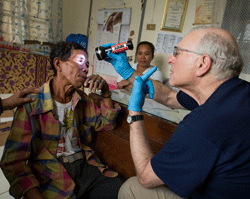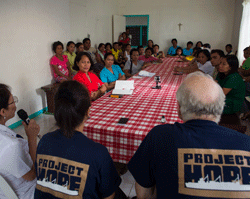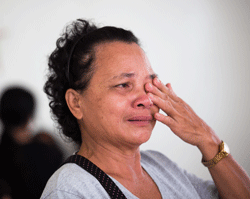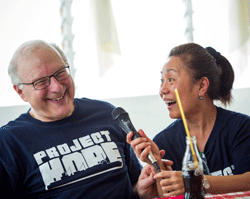
“Dr. Todd” Helps Survivors of Haiyan
Dr. Todd Holzman, HOPE volunteer and practicing psychiatrist from Boston, is helping survivors of Haiyan cope following the trauma they suffered.

The patient was an older man, the size of a teenage boy, but with a deeply etched face, the color of the muddy Panay river the day it so recently swallowed many of the local rice fields. The patient had a mouthful of teeth reminiscent of the newly broken, jutting mahogany trees that littered the surrounding hills. He had weathered typhoon Haiyan, but this was not his first visit to Tapaz District Hospital in recent weeks. Today he came complaining of dizziness.
It was one of Dr. Todd Holzman’s last patients of the day. The Project HOPE volunteer, a child and adult psychiatrist, is no stranger to global health. He juggles a consultancy in global psychiatry at Massachusetts General Hospital, a private practice in Cambridge, Massachusetts and regular volunteer medical missions with his wife Terry. It had been a while since he had had this kind of clinical load, but Holzman was still feeling good.
He talked with the patient about his symptoms and then asked him directly, “So, what are you here for?”

“I’m lonely,” the man admitted.
“I learned that his wife passed away two years ago– they had been together for 50 years. His son had also died young. And he was living with a host of medical problems,” recounted Holzman.
As he described it, suddenly the nurse in the room chimed in and began suggesting things that the patient could do to become involved in the community. By the time the exam ended, all three were laughing and cracking jokes.
Holzman’s gentle way of drawing out his patients has endeared him to them. In the few days he has been on the ground in Tapaz, he has already earned several telling nicknames, including “Santa Claus” and “the priest.”
“I didn’t know whether I was going for a check-up or confession,” one patient remarked to Project HOPE volunteer Seth Tate after being seen at the local clinic by “Dr. Todd.”
Years of experience with patients in emergency situations has also given Holzman a sharp understanding of what might be going on in a person’s mind after a traumatic event. As Chair of Disaster Services for the Massachusetts chapter of the American Red Cross when the September 11 attacks happened, he helped to coordinate the family support operation that was set up at Logan Airport. Recently, in the wake of the Boston Marathon bombing, Holzman’s private practice filled with victims and first responders in need of counseling.

“After their first needs are met– safety, food, dry clothes, etc.– people want to tell their story,” he said.
Back at Tapaz District Hospital, Dr. Todd organized a special session for employees for precisely that purpose. A skeleton staff of a half-dozen had been tending to the needs of the 20-odd patients on the day of the typhoon– which passed directly through the rural town less than four weeks earlier.
“A person’s experience is usually kept quiet and personal within each individual. But during a disaster, whether it is a mass casualty event like a typhoon, deadly disease or war, or an individual one such as cancer or a car crash, everyone goes through the same things: a sense of total helplessness, hopelessness, being alone, and being at the mercy of the situation or a person that has no mercy. That’s the common denominator,” explains Holzman. “The antidote for that is compassionate human contact. Someone who genuinely cares and wants to hear your story.”
The room was packed. When Holzman asked how many of them had experienced the feelings he described above, everyone raised their hands. Many of those who had been working at the hospital on the day of the typhoon stood and spoke in quivering voices of terror, faith, strength– of comforting patients as they moved them from room to room while the roof overhead disappeared piece by piece and then of anxiety– of their own flattened homes– reached by wading, climbing, chopping.

When it ended, the room was still full and almost no one had taken more than a sip from their Coca Cola bottles. Someone began singing a song about smiling through tears and others joined in. There was hugging.
“You don’t have to study in Vienna to figure out what’s going on,” said Holzman. “You just have to listen and sincerely care, and people respond to that. They feel that they’re no longer alone, which brings that sense of community and commonality.”
Hospital chief Dr. Jean Aposaga Gloria closed the meeting by thanking Dr. Todd, admitting that “it has made us all smile and feel lighter.”
Holzman underscored the importance of such meetings in a place where resources have been stretched thin. “They are caregivers. You can give them antibiotics, a blood count machine– and that’s good, really important– but if you can help make them more durable, more resilient, then you are giving the gift to their patients of someone who is there for them.”
“Everybody wants to help– this is a way of helping. It’s a drop in the ocean but it’s OUR drop.”